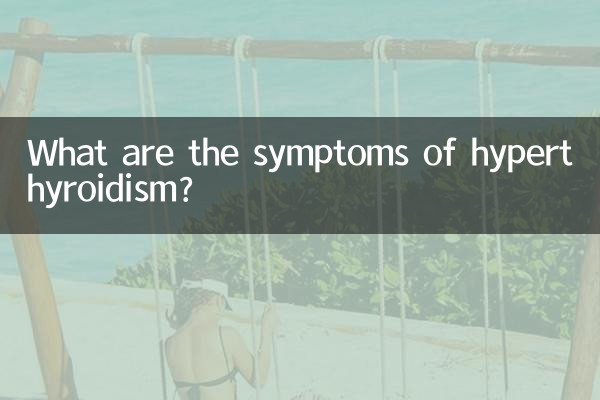What are the symptoms of hyperthyroidism?
Hyperthyroidism (referred to as "hyperthyroidism") is a common endocrine disease. Excessive secretion of thyroid hormone leads to accelerated metabolism and a series of symptoms. In recent years, the incidence of hyperthyroidism has increased and has become a hot topic in the health field. This article will combine the hot content on the Internet in the past 10 days to provide you with a detailed analysis of the symptoms, diagnosis and precautions of hyperthyroidism, and attach structured data for reference.
1. Common symptoms of hyperthyroidism

The symptoms of hyperthyroidism are diverse and may involve multiple systems. The following are common clinical manifestations:
| Symptom classification | Specific performance |
|---|---|
| Metabolism related | Afraid of heat, excessive sweating, weight loss, and increased appetite |
| cardiovascular system | Palpitations, tachycardia, arrhythmia |
| nervous system | Anxiety, irritability, insomnia, hand tremors |
| Eye symptoms | Protosis, eyelid edema, blurred vision (seen in Graves' disease) |
| digestive system | Diarrhea and increased bowel movements |
| Musculoskeletal | Muscle weakness, osteoporosis |
2. Recent hot discussions: the relationship between hyperthyroidism and living habits
In the past 10 days, discussions about hyperthyroidism on social media and health forums have mainly focused on the following aspects:
1.Iodine intake and hyperthyroidism: Excessive intake of iodine (such as kelp, seaweed, etc.) may induce hyperthyroidism, especially for people with abnormal thyroid function.
2.Stress and hyperthyroidism: Long-term mental stress and excessive pressure may be the cause of hyperthyroidism, which is related to the regulatory mechanism of thyroid hormone secretion.
3.The trend of younger people with hyperthyroidism: Data show that the incidence of hyperthyroidism among people aged 20-40 has increased, which may be related to factors such as staying up late and eating irregularly.
3. Diagnosis and examination of hyperthyroidism
If the above symptoms occur, it is recommended to seek medical treatment in time. The following are common inspection items:
| Check items | significance |
|---|---|
| Five items of thyroid function | Detect hormone levels such as TSH, FT3, FT4 |
| Thyroid ultrasound | Observe thyroid morphology and blood flow |
| Thyroid antibody test | Assists in the diagnosis of autoimmune hyperthyroidism such as Graves' disease |
4. Treatment and daily management of hyperthyroidism
Treatments for hyperthyroidism include medications, radioactive iodine therapy, and surgery. The following are the key points for daily management:
1.diet modification: Avoid high-iodine foods and increase protein and vitamin intake.
2.Regular schedule: Ensure adequate sleep and avoid overexertion.
3.Emotional management: Relieve stress through meditation, exercise, etc.
5. Summary
The symptoms of hyperthyroidism are complex and varied, and early detection and treatment are crucial. Based on recent hot topics, the public needs to pay attention to the impact of living habits on thyroid health. If you are suspected of having hyperthyroidism, you should seek medical examination promptly and receive standardized treatment under the guidance of a doctor.

check the details

check the details